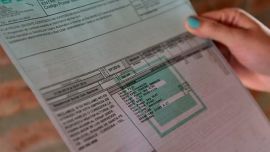President Mauricio Macri a n d h i s C a b i n e t hunkered down in the Olivos presidential residence yesterday after another week of financial turmoil in Argentina which saw renewed calls for the president to reassess his bid for reelection in October.
This time, however, the aftershocks of negativity had emanated from the very area which has supported the Cambiemos so fiercely: the international business community and the financial media. A series of negative headlines – from influential publications such as the Financial Times, Bloomberg and the Wall Street Journal – were quickly noticed in local outlets and more crucially in the markets, prompting investors to dump Argentine assets.
In response, President Macri broke ground to reaffirm once again that he was running. Speaking Thursday he said there was no going back. Argentina would stay the course – and so would he, the President declared.
Locally, the exchange markets reflected the volatility. As they closed yesterday for the week, numbers indicated the peso had depreciated by more than eight percent against the dollar over the past week, closing at 46.90 pesos per greenback. That was lower than the peak registered on Thursday, which saw some dollars selling for 47.50 pesos in Banco Nación.
The Central Bank, in response, raised its reference interest rates – already among the highest in the world – from 68 percent to 71 percent, as it witnessed a strengthening of the dollar across the globe with emerging markets taking a hit.
However, despite peaks on Wednesday and Thursday, the national currency weakened slower yesterday, by only 1.4 percent. So far this year, the peso has lost 17.03 percent of its value.
The government considers that the strength of the peso is the main inflationary factor. In March, price increases hit 4.7 percent, accumulating 11.8 percent in the first quarter. Inflation over the past 12 months totals 54.7 percent.
Meanwhile, country risk, as measured by JP Morgan, soared on Wednesday to 1,011 points – a record under the Macri administration – before dropping down to 950 at the end of the day. On Friday, it closed at 967 points.
According to sources with knowledge of yesterday’s Cabinet meeting, the president asked his team to transmit “calm.”
NEGATIVE HEADLINES
Without a doubt, the country’s economic outlook is drawing heavy attention overseas – especially in the wake of new polls indicating that former head of state Cristina Fernández de Kirchner would see off Macri in a head-to-head run-off vote for the presidency
Earlier this week, the Financial Times published an article saying Argentina was “on the brink of default.” Bloomberg echoed these default fears while freely using the word “panic.” Forbes was scathing about Macri himself with the headline “A weak president has investors dumping Argentina.” The Wall Street Journal (which in the past has criticised Kirchnerite populism more savagely than any other overseas media) preferred to highlight the crisis rather than point fingers: “Argentina is a big country with terrible monetary and fiscal problems” - last year the Journal insisted that Macri’s agreement with the International Monetary Fund was not the “right medicine.”
Nor was the negativity limited to the Anglo-Saxon press with Spain’s El País describing Argentina as “nearing the abyss” amid doubts about Macri’s “disappointing” administration.
Speaking yesterday in Jujuy, Interior Minister Rogelio Frigerio said the country was experiencing “volatility,” adding that the government was trying to deliver “greater certainty.”
Frigerio, who described Argentina as the “most fragile” economy in the region, said Cambiemos is working “to contain the macroeconomic variables which affect Argentines the most – the first clearly is inflation.”
As happens every Friday, Macri led the meeting in the Olivos presidential residence. In a “Zen” tone, as described by two of the witnesses who participated in the meeting, the President asked his collaborators to transmit “calm”. As he said in the interview he gave on Monday, “there is no other way”.
‘IN ARGENTINA , WE CHOOSE CANDIDATES’
Pre-empting that demand, key Cambiemos figures took to the airwaves to defend the government and play down the situation.
In a Thursday evening television interview (TN), Cabinet Chief Marcos Peña was uncompromising about Macri’s candidacy and about his policies being the “right path.” He did admit to over-ambitious inflation targets in the past and explained the current turbulence by saying that Argentina would remain vulnerable while obliged to borrow abroad. But throughout the interview he insisted on the need to look beyond the current cycle to the long term and structural reform.
The same day Buenos Aires City Mayor Horacio Rodríguez Larreta joined the voices dismissing rumours of unrest and declaring Macri would definitely be a presidential candidate.
“Candidates are chosen in Argentina, not on Wall Street,” Buenos Aires Mayor Horacio Rodríguez Larreta said Thursday, speaking to Radio La Red.
“The candidate for president is Mauricio Macri. María Eugenia Vidal is the candidate for the governorship of Buenos Aires,” he insisted, addressing calls for the Buenos Aires Province governor to run in Macri’s stead. Since the current financial crisis began a year ago, Vidal has consistently been at least 10 percent ahead of Macri in the opinion polls.
Earlier in the week leading business figures – during a luncheon given by the Inter-American Council for Commerce and Production (CICYP) – repeatedly asked the governor if she would run for the Presidency, a line of speculation which has also reached the international media.
“I’m not an expert in markets but what has happened in the last few months is that the dollar goes up and down, up and down, up and down. If one looks at it [the exchange rate] in relation to seven or eight months ago, when the deal with the International Monetary Fund (IMF) was signed, the dollar has been relatively stable in the long term,” the mayor added. “What’s more, inflation has surpassed the growth of the dollar.”
Star Ecuadorean adviser and political guru Jaime Durán Barba followed, telling Bloomberg that “polls aren’t a crystal ball, they’re just a way of understanding what people want, what they dream about, what they’re thinking.”
A harassed Macri administration now braces itself for a potentially volatile week but with at least one crumb of comfort - the May Day public holiday in midweek preceded by an all but general strike the previous day should make for some moments of enforced calm.

























Comments